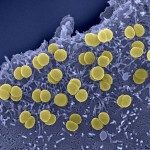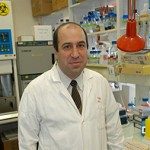Link to Pubmed [PMID] – 15688522
APMIS ; 112(11-12): 753-70
Acute bacterial infection of the central nervous system requires rapid and adequate management. Etiological diagnosis is hence crucial. Moreover, the epidemic threat of certain bacteria necessitates a reliable characterization of the involved bacterial strains to follow the spread of epidemic strains. Conventional identification and characterization of etiological agents are basically based on culture and identification of bacterial markers most frequently by serological assays. Molecular identification and characterization of bacteria have been employed. They provide more reliable analysis of bacterial isolates. Molecular methods for non-culture diagnosis of bacterial infections have recently been developed. In many cases, the molecular assays have decreased the identification time of positive cultures and rescued detection of pathogens in culture-negative clinical samples.

